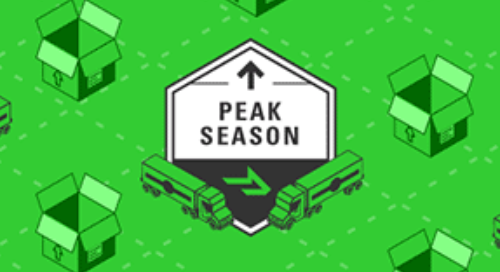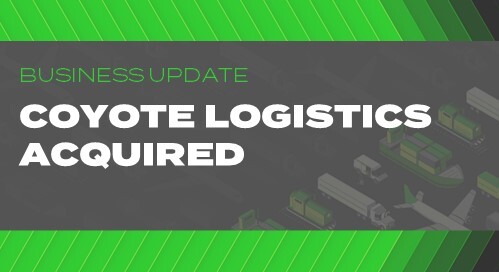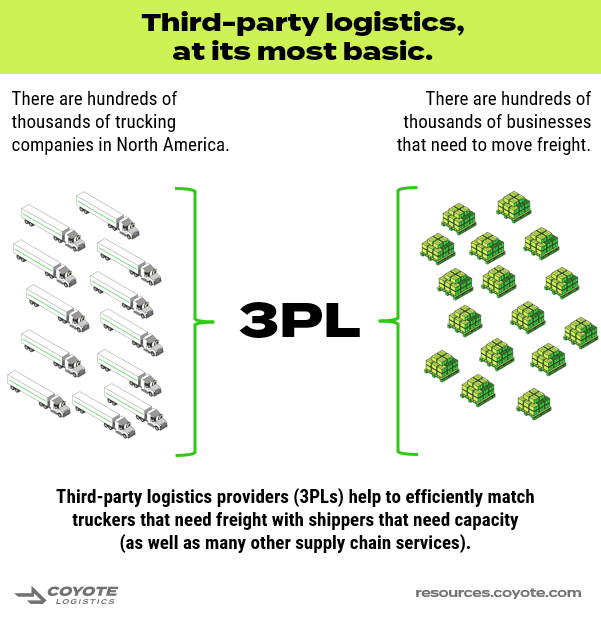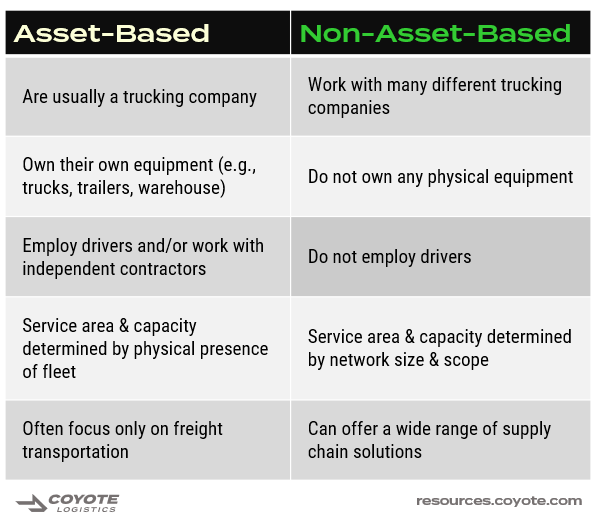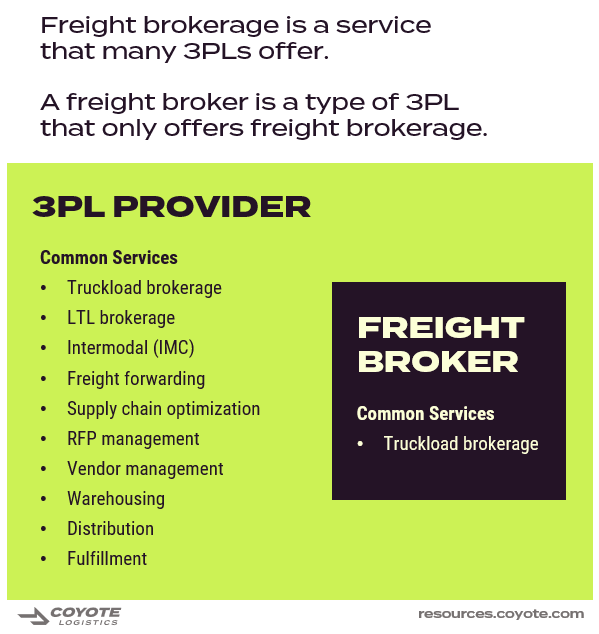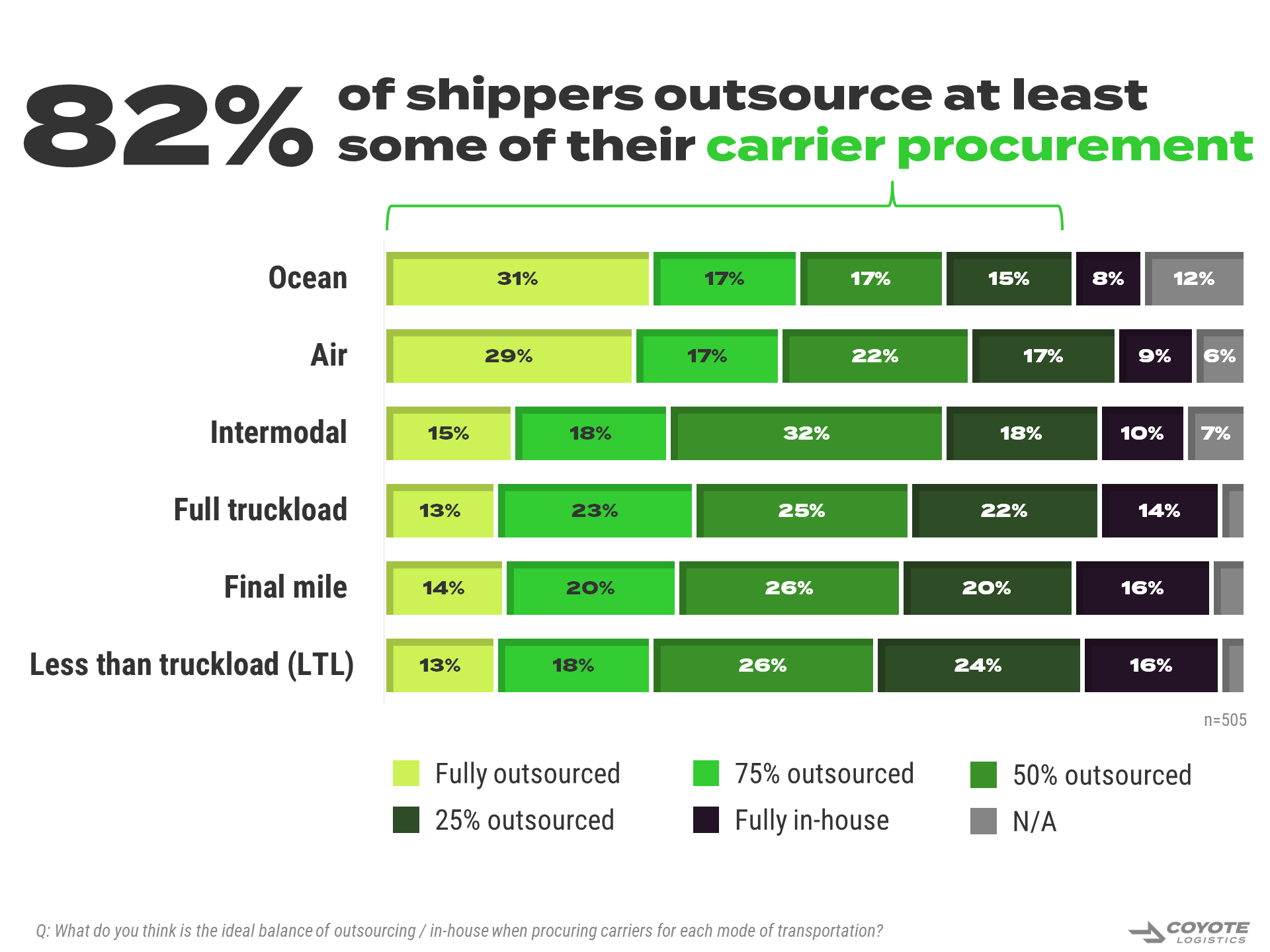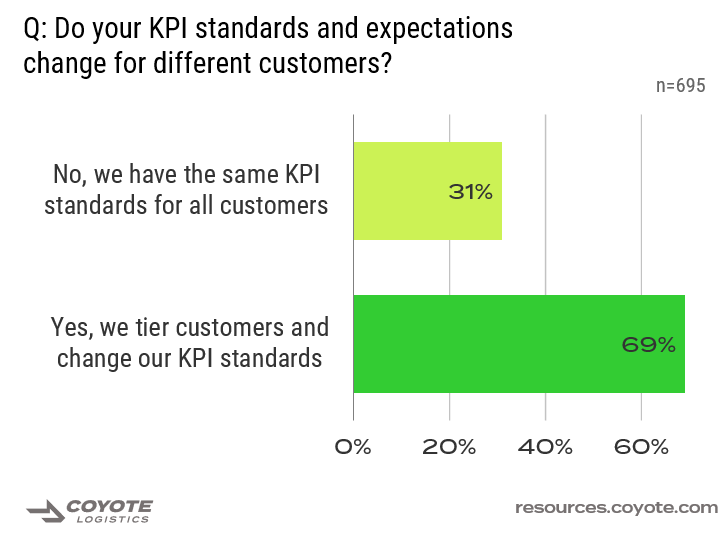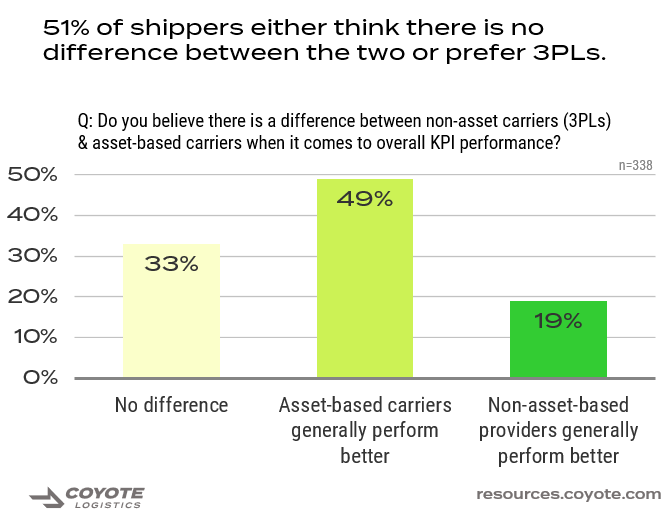What Is a 3PL? The Beginner’s Guide to Third-Party Logistics

You may have heard the terms “brokerage”, “3PL” and “non-asset-based provider” — but do you know what they mean?
More importantly, do you know when (or how) to use them in your supply chain?
Almost every shipper relies on a blend of third-party providers to manage inventory, fulfill orders and transport freight.
In fact, according to our research on logistics outsourcing, on average across 21 areas of supply chain management, 75% of shippers think at least some level of third-party support is ideal.
If you’re not relying on 3PLs, you may be missing out on opportunities for easier shipping, more capacity and better rates.
Beginner’s Guide to Third Party Logistics
What Is a 3PL?
A third-party logistics company (3PL) is a service provider that either arranges or handles a variety of supply chain functions for a business.
These functions can include brokering, shipping, storing, or packing a company’s freight, as well as supply chain strategy and access to technology.
Note that not all 3PLs have the same business model — there are different types of providers that focus on different areas of supply chain operations.
Most 3PLs are non-asset-based (i.e., they do not own physical equipment) and arrange for logistics services on behalf of shippers. Some 3PLs, however, do own assets, like warehouses used for ecommerce fulfillment.
Businesses will either partially or fully outsource areas of their supply chain management (e.g., carrier procurement, warehousing, etc.) to 3PLs when a 3PL can offer increased efficiency, expertise and/or cost savings compared to trying to manage in-house.
A third-party logistics company (3PL) is a service provider that either arranges or handles a variety of supply chain functions for a business.
Businesses will outsource areas of their supply chain management to 3PLs to gain efficiency, expertise and/or cost savings.
What Does a 3PL Do?
3PLs offer a wide range of supply chain services.
Some 3PLs only focus one or two of these, while others have a more comprehensive solutions portfolio.
Core 3PL services can include:
- Truckload brokerage
- LTL brokerage
- Intermodal marketing company (IMC)
- Air & ocean freight forwarding
- Supply chain consulting/optimization
- Managed Transportation
- RFP management
- Carrier scorecarding
- Warehousing
- Distribution & fulfillment
When you hear “3PL” in North America, it’s often referring to domestic transportation management — AKA freight brokerage.
Asset-Based vs. Non-Asset-Based: What Do They Mean?
Every provider should be an asset to your supply chain.
But they don’t need to have their own assets to be an asset.
There’s an old saying that “possession is 9/10ths of the law.” In transportation, it determines what kind of a provider you are.
Asset-Based Carriers
Generally speaking, this is a trucking company. An asset-based carrier owns their own equipment (trucks and trailers) and employs the drivers that operate it.
These range from large carriers with national fleets, yards and warehouses, down to single-truck owner-operators.
Asset carriers can offer a range of equipment and services, including power-only, dry van, refrigerated and open-deck. They also operate in both the full truckload and less-than-truckload (LTL) spaces.
In the intermodal market, an asset carrier owns their own containers, and sometimes their own drayage operations, but the railroads own and operate the trains.
Non-Asset-Based Providers
Non-asset-based providers may offer many or all of the same services as their asset-based counterparts, but they do not own any physical equipment (trucks, trailers, etc.) or employ drivers themselves.
Instead, they maintain dense networks of carriers that they connect with shippers whose freight matches the carriers’ availability, typically with digital freight matching technology.
When you use a non-asset-based provider to handle your truckload, LTL or intermodal shipping needs, you are effectively outsourcing carrier procurement to them.
Most 3PLs are non-asset based (see below).
Asset-Light Carriers
Though a smaller subset of the industry, there are asset-light providers who fall somewhere in between asset and non-asset providers.
Asset-light providers will lease or own a few strategic assets (terminals, trailers, intermodal containers, etc.) but a majority of their business is done as a broker.
Are 3PLs Asset or Non-Asset Providers?
It depends on what types of services they provide.
Generally speaking, 3PLs tend to either be non-asset or asset-light, but not always.
For instance, a 3PL that specializes in e-commerce fulfillment could own and operate warehouses and a fleet of last-mile delivery vehicles. Their customers would be shippers outsourcing fulfillment to a third-party.
3PL vs. Freight Broker: Is There a Difference?
All freight brokers are 3PLs.
Not all 3PLs are freight brokers — many 3PLs broker freight, while others do not.
Think of “3PL” as an umbrella term, with freight brokerage (truckload, LTL, intermodal, etc.) as a non-asset-based service that falls underneath.
But Shippers Are Most Likely to Use 3PLs for Freight Brokerage
All that said, freight brokerage is the most likely area of supply chain management for shippers to outsource, according to our research on supply chain outsourcing.
Looking at the average across all modes, 82% of shippers rely on third-party providers to procure capacity for at least some of their freight, with 38% using 3PLs for a majority of their shipments.
Get more insights like this by reading the full study.
Which Is Better, Asset-Based Carriers or 3PLs?
It all depends on your needs, including equipment types, service diversity, geography, flexibility, capacity, rates and reliability.
Think of your freight providers — both asset and non-asset — like tools for your supply chain. You want to use the right tool for the right job.
An asset-based carrier may be able to offer standout pricing and service on some of your lanes, but in others they may lack the equipment density to be a reliable option, and a 3PL might be a great solution.
Most shippers actually tier their customer KPIs, which can help you decide which provider is right for each opportunity.
Download the full results from the KPI research study.
Performance & Service
Enough hypotheticals: What do other shippers really think?
When it comes to KPI performance, 51% of shippers think there is either no difference between asset and non-asset or they even prefer non-asset-based providers.
From these results, it seems safe to conclude that the service shippers experience with a 3PL ranges from normal to great; it certainly doesn’t appear to be suffering.
Download the full results from the KPI research study.
Pricing & Rates
A 3PL is essentially a middleman between a shipper and a trucking company, so by nature, they will be more expensive, right? Not necessarily.
Even though 3PLs will take a cut of the transaction, it doesn’t mean the price you pay will be more.
- 3PLs can move thousands of loads per day, so it’s often possible that they’ll be able to negotiate a better rate on your behalf based on the total volume of freight they’re able to direct to that carrier, yours included. This is especially true when you use a 3PL to ship LTL.
- 3PLs work with thousands of carriers, so they’ll be much more efficient and effective at finding the right carrier (or carriers) for your opportunity.
What Are the Core Benefits of Working With a 3PL?
The 3PL market is a $60 billion industry. With so many shippers relying on these providers every day, and the market continuing to grow every year, it’s clear they provide value.
Here are the core reasons businesses incorporate 3PLs in their provider mix.
Network Scale and Reach
3PLs help you consolidate an extremely fragmented truckload market into a single point of contact. There’s no other way for you to efficiently get in touch with the hundreds of thousands of small and mid-sized trucking companies that make up 97% of the industry.
Responsive Capacity
3PLs aren’t limited by the physical presence of their fleet and equipment. When an asset carrier doesn’t have a driver available, or own a certain type of equipment, they can’t help you. 3PLs specialize in finding what you need, no matter what.
Flexibility
The build vs. buy dilemma is real for most companies. Relying on outsourced logistics providers can close a competency gap quickly. By using third parties, it’s easy to scale up or pare down based on the ebbs and flows of your shipping needs.
Service Line Diversity
While some 3PLs only offer truckload brokerage, many have a diverse portfolio of logistics services. This will help streamline procurement if, for instance, you have both LTL and truckload freight.
Full Coverage in Your Supply Chain
If you rely on asset carriers for most of your freight, but still have a lane or two that are difficult to cover, a 3PL can help you find a solution where others have failed. They help to fill in the gaps in your supply chain.
Access to Technology
Many 3PLs offer powerful digital freight matching platforms, as well as opportunities to streamline your processes with API/EDI integration. Since many do not own physical assets, advanced technology is often a core focus of their business model.
Where Should I Use 3PLs in My Supply Chain?
You can use a 3PL in any area of supply chain management.
According to over 500 shippers, when asked how they prefer to handle 21 different areas of supply chain operations, there wasn’t a single area where a majority thought fully in-house was ideal (the closest was only at 36%).
There were a few areas in the research study where 3PLs excelled, namely carrier procurement, but shippers showed strong 3PL usage across every discipline.
Related: 3 Steps Building an Supply Chain Outsourcing Strategy
Who Should You Work With?
Both asset-based and non-asset-based providers have a place in nearly every supply chain — remember that businesses are most likely to use both.
If you choose to exclude either 3PLs or asset-based carriers, you’re probably limiting your capacity and service options.
There are a couple truisms about carrier selection:
- Asset-based carriers often excel at consistent, higher volume, drop trailer freight in their service footprint.
- 3PLs often excel at spot freight, non-standard opportunities with live loads.
But there are many, many exceptions to this logic.
Coyote, for instance, helps to arrange capacity for thousands of contract loads every day, including drop trailer shipments.
Pro Tip: Focus on developing long-term, mutually beneficial relationships with a core group of providers of both types and learn where each excel in your supply chain.
Looking for a 3PL to Make Freight Shipping Easier?
Whether you’re looking to get an instant spot quote, or need help setting a better supply chain strategy, we can help.
As the 2nd largest 3PL in North America, you can easily tap into our network of 70,000 vetted carriers and our diverse service portfolio of LTL, intermodal, final mile, outsourced supply chain and more.
And you can always talk to our logistics specialists to help strategize what’s right for your supply chain.



